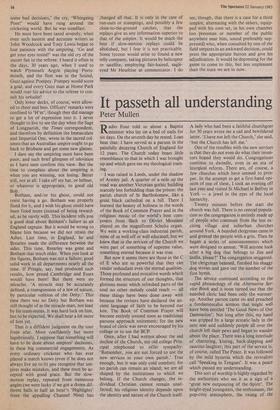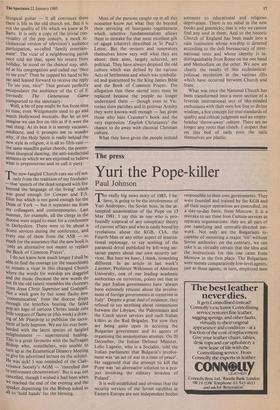It passeth all understanding
Peter Mullen
D adio Four told us about a Baptist 1.Xminister who lay on a bed of nails for six days. On the seventh day he rested. I can beat that: I have served as a parson in the painfully decaying Church of England for 12 years. The Church today bears little resemblance to that in which I was brought up and which gave me my theological train- ing.
I was raised in Leeds, under the shadow of Armley jail. A quarter of a mile up the road was another Victorian gothic building scarcely less forbidding than the prison: the parish church of St Bartholomew, like a great black cathedral on a hill. There I learned the beauty of holiness in the words of the Book of Common Prayer and in the religious music of the world's best com- posers from Bach to Olivier Messiaen played on the magnificent Schultz organ. We were a working-class industrial parish, none of us well off or well educated; but we knew that in the services of the Church we were part of something of supreme value, something eternal because it was true.
But now it seems there are those in the C of E who are so powerful that they can render redundant even the eternal qualities. Those profound and evocative words which formed the structure of our thoughts, that glorious music which refreshed parts of the soul no other melody could reach — all these things have been done away with because the revisers have declared the an- cient language of faith to be beyond our ken. The Book of Common Prayer will become entirely unused soon as traditional parsons approach retirement; for the new brand of cleric was never encouraged by his college or to use the BCP.
Once, after I had written about the sad decline of the Church, my old college Prin- cipal telephoned to offer sympathy: `Remember, you are not forced to use the new services in your own parish.' True enough, but it was only cold comfort; for no parish can remain an island; we are all shaped by the institutions to which we belong. If the Church changes, the in- dividual Christian cannot remain unaf- fected; his religious identity depends upon the identity and nature of the Church itself.
A lady who had been a faithful churchgoer for 50 years wrote me a sad and bewildered letter. 'I have not left the Church,' she said, `but the Church has left me.'
One of the troubles with the new services is that they do not even do what their inven- tors hoped they would do. Congregations continue to dwindle, even in an era of liturgical reform. There are, of course, a few churches which have seemed to pros- per. In the attempt to get a first-hand opi- nion of one of these, I took an evening off last year and visited St Michael le Belfrey in York — a jewel in the eyes of the local hierarchy.
Twenty minutes before the start the church was full. There is no central popula- tion so the congregation is entirely made up of people who commute from the less ex- citing village and suburban churches around York. A bearded clergyman came in and greeted the people with a grin. Then he began a series of announcements which were designed to amuse: 'Will anyone look after a big dog that belongs to Jim and Stella, please?' The congregation sniggered. The clergyman beamed, finished his shaggy dog stories and gave out the number of the first hymn.
The service continued according to the vapid phraseology of the Alternative Ser- vice Book and it soon turned out that the bearded cleric had been only the warmer- up. Another parson came on and preached a fundamentalist sermon that might well have been entitled `The Good News of Our Damnation'. Not long after this, my hand was gripped by a large ecstatic lady in the next seat and suddenly people all over the church left their pews and began to wander about the place. There was a long interlude, of chattering, kissing, back-slapping and raucous laughter; this part of the service is, of course, called The Peace. It was followed by the mild hysteria which the revivalists call 'Speaking in Tongues'. It was a peace which passed my understanding.
This sort of worship is highly regarded by the authorities who see it as a sign of a `great new outpouring of the Spirit'. The bright-eyed youngsters, the enthusiasm, the pop-cosy atmosphere, the twang of the
liturgical guitar — it all convinces them there is life in the old church yet. But it is not the quality of life which we knew at St Barts. It is only a copy of the trivial con- viviality of the pop concert, a mock ec- clesiastical version of television's audience participation, so-called family entertain- ment'. The vicar of a neighbouring parish once told me that, upon his return from holiday, he stood on the chancel step, smil- ed at his congregation and called out `Nice to see you!' Then he cupped his hand to his ear and leaned forward to receive the reply 'To see you, nice!' That gesture perfectly encapsulates the ambience of the C of E (revised): The Generation Game transported to the sanctuary.
Well, a bit of pop might be fun from time to time; even Wittgenstein used to go and watch Hollywood musicals. But let us not imagine we can live on this as if it were the real thing. At its best it is merely vacuous; mediocre; and it prompts me to wonder why, if the Holy Spirit is really behind the new style in religion, it is all so fifth-rate the same maudlin guitar chords, the preten- tious liturgical dancing, the anti-intellectual sermons in which we are enjoined to believe what is preposterous and to call it piety.
The new-fangled Church cuts me off not only from the tradition of my forebears that 'speech of the dead tongued with fire beyond the language of the living' which was good enough for Cowper and T.S. Eliot but which is not good enough for the Dean of York — but it separates me from my colleagues and contemporaries. Last summer, for example, all the clergy in the diocese were urged to meet for a conference in Derbyshire. There were to be about a dozen services during the conference, and every one of them from the ASB — so Much for the assurance that the new book is 'only an alternative not meant to replace the Book of Common Prayer'.
I do not know how much longer I shall be able to find the courage (or the masochism) to remain a vicar in this changed Church Where the words for worship are doggerel and the music (because the new words do not fit the old tunes) resembles the choruses from Jesus Christ Superstar and Godspell. Not a week goes by but some flashy new `communication' from the diocese drops through the letterbox bearing the failed pop-art logo of cartoon Christs inside cute little tongues of flame or (this week) a draw- ing of Mr Peardrop to publicise the sacra- ment of holy baptism. We are for ever bom- barded with the latest species of fangled enlightenment — supernatural healing. This is a great favourite with the Suffragan Bishop who, nonetheless, was unable to turn up at the Ecumenical Deanery Meeting to give his advertised lecture on the subject. He was sick! I was reminded of the Clair- voyance Society's AGM — 'cancelled due to unforeseen circumstances'. But it was not cancelled, though I wished it had been when We reached the end of the evening and the sneaker deputising for the Bishop asked us all to 'hold hands' for the blessing. Most of the parsons caught up in all this nonsense know not what they do beyond their servicing of bourgeois togetherness which selective fundamentalism allows them to mistake for that most excellent gift of agape (charity) described in St Paul's Letter. But the revisers and innovators themselves know very well what they are about: their aims, largely achieved, are political. They have always despised the old culture which was defned by the various Acts of Settlement and which was symbolis- ed and guaranteed by the King James Bible and the Book of Common Prayer. The allegation that these sacred texts must be replaced because the people no longer understand them — though even in Vic- torian slum parishes and in postwar Armley they were known well enough — has given those who hate Cranmer's book and the very expression 'English Christianity' the chance to do away with classical Christian culture.
What they have given the people instead
amounts to educational and religious deprivation. There is no mind in the new books and gimmicks; that is why we cannot find any soul in them. And so the historic Church of England has been made into a vain institution whose worship is directed according to the dull bureaucracy of inter- national texts and whose identity is in- distinguishable from Rome on the one hand and Methodism on the other. We now see clearly the results of this ecclesiastical- political revolution in the various rifts which have occurred between Church and State.
What was once the National Church has been transformed into a mere section of a feverish international sect of like-minded enthusiasts with their own hot-line to divine wisdom, a hot concept for true standards of quality and critical judgment and an empty- headed 'throw-away' culture. There are no longer any roots that clutch. I suspect that on this bed of nails even the nails themselves are plastic.







































 Previous page
Previous page